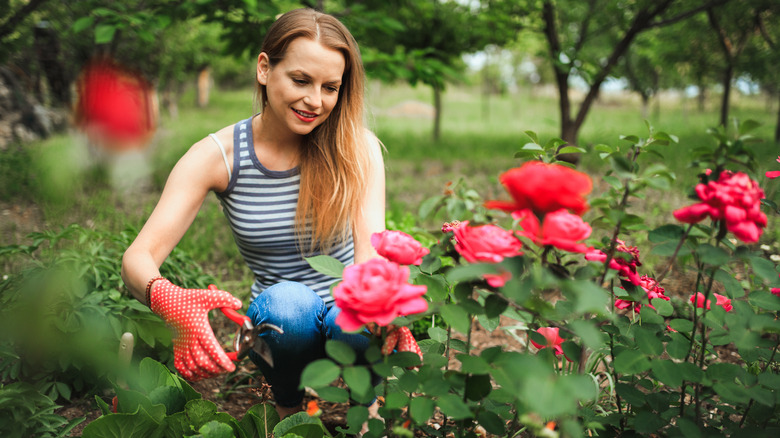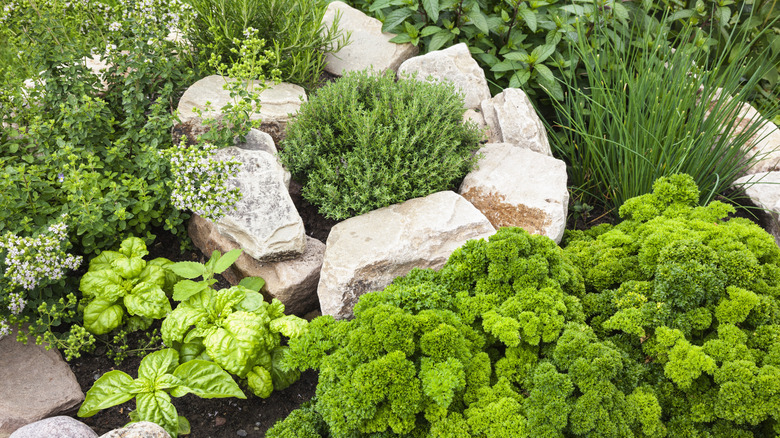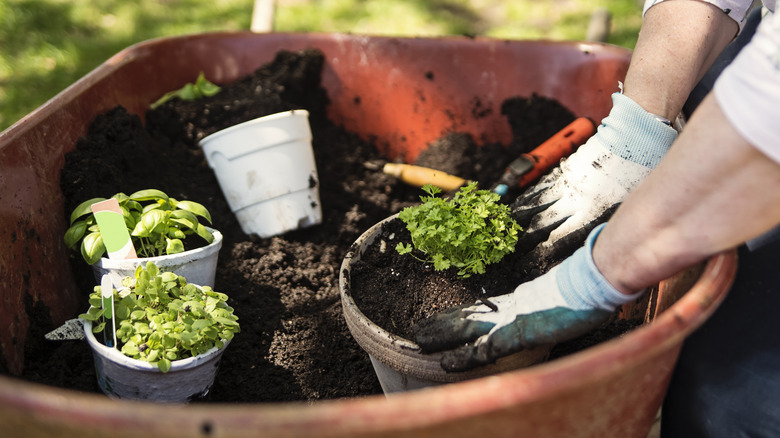The Unexpected Herb That Grows Excellently Next To Roses
Many who consider companion planting overlook a standout pair: parsley and roses. When you decide to place parsley and roses side by side in your garden, you're not just making a design choice — you're embarking on an ecological adventure. Originating from the Mediterranean and parts of Southern Europe, parsley (Petroselinum crispum) stands out with its lively green leaves, available in both curly and flat variants. Thanks to its hearty disposition, it flourishes across various climates and doubles up as a natural guard against pesky intruders. This tenacious herb stands tall, safeguarding your roses from potential harm.
On the flip side, roses, hailing from the Rosaceae family, aren't just about elegance. These woody perennials bloom in mesmerizing colors, casting a fragrant spell that uplifts your garden's aura. Their rich tones form a striking juxtaposition against the lush green of parsley, offering a harmonious visual treat that also serves a practical purpose. Together, parsley's ability to deter pests and the enchanting allure of roses provide a spectrum of advantages, spanning from aesthetic beauty to functional pest control. But the benefits don't end there. Delving deeper into this combination, you'll soon realize how these two can reshape your garden, optimizing its health, looks, and holistic vitality.
A powerful blend that deters pests
Roses, as magnificent as they are, face common challenges like every other plant in your garden. One primary concern is the presence of pests. You've probably noticed or even battled against common culprits like aphids and rose beetles. These pests have a particular liking for roses and can rapidly diminish the health and beauty of your plants if left unchecked. Luckily, parsley is an organic solution that, while typically thought of as a mere herb or garnish, plays a critical role in rose gardening. In fact, research indicates that parsley naturally deters many garden pests. By strategically planting it amidst your roses, you're employing a natural method to protect your flowers. This living barrier keeps these pests at bay, ensuring your roses stay vibrant and free of pest-induced damage.
Indeed, parsley's role isn't limited to merely being a protective barrier. Beyond that, it acts as a magnet for beneficial creatures, especially the enchanting swallowtail butterflies. These insects, drawn to the herb's inviting ambiance, find it a preferred spot to lay their eggs. With the ideal conditions that parsley offers, these eggs soon hatch, turning your garden into an essential nursery for fledgling caterpillars. As the days progress, a magical transformation unfolds. These very caterpillars, after undergoing their metamorphosis, emerge as breathtaking butterflies. This entire cycle, from egg to butterfly, unfolds in your garden, showcasing nature's miraculous rhythm and beauty.
A formidable and resilient ally
Another intriguing quality of parsley is its ability to enhance the fragrance of roses. You might wonder how a simple herb could impact the aroma of such a dominant flower. The science behind it is fascinating. Specific compounds in parsley help adjacent roses release more of their essential oils when they absorb them. This natural boost results in a stronger and more intoxicating scent from your roses.
One more admirable trait of parsley is its robustness. This herb has impressive adaptability, thriving across a broad spectrum of climates. From the chillier regions represented by USDA Zone 2 to the warmth of Zone 11, parsley showcases its resilience by maintaining its vitality. Its adaptability doesn't stop with temperature alone. Parsley has specific soil preferences, yet it's not overly fussy.
Ideally, it flourishes in consistently moist soil, where water retention is balanced with good drainage. This ensures that the roots receive adequate hydration without the risk of rotting. Furthermore, parsley remains unfazed, unlike some plants that can be sensitive to humidity fluctuations. Whether you're in a coastal area with high humidity or an inland region with drier air, this herb retains its lush green appearance and growth vigor. This steadfast nature of parsley makes it a reliable partner for roses in your garden. While parsley's care might require slightly more frequent watering sessions, especially during particularly dry spells, this minor effort pales compared to its myriad advantages.


